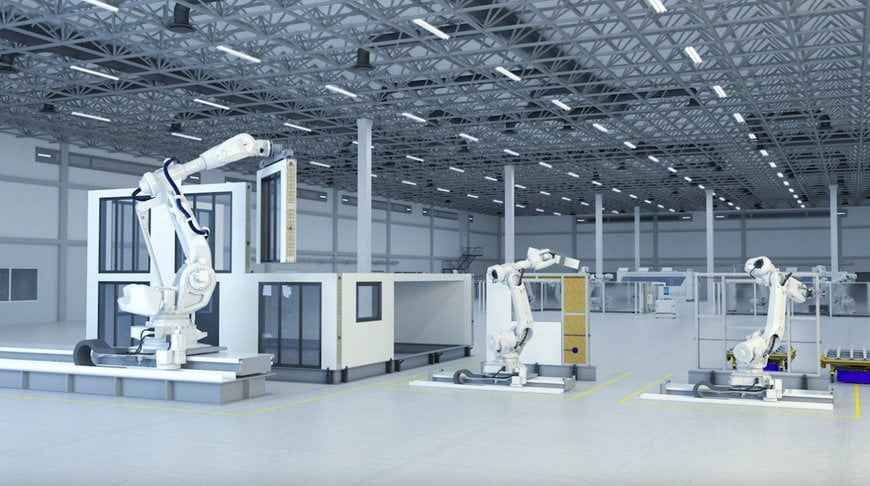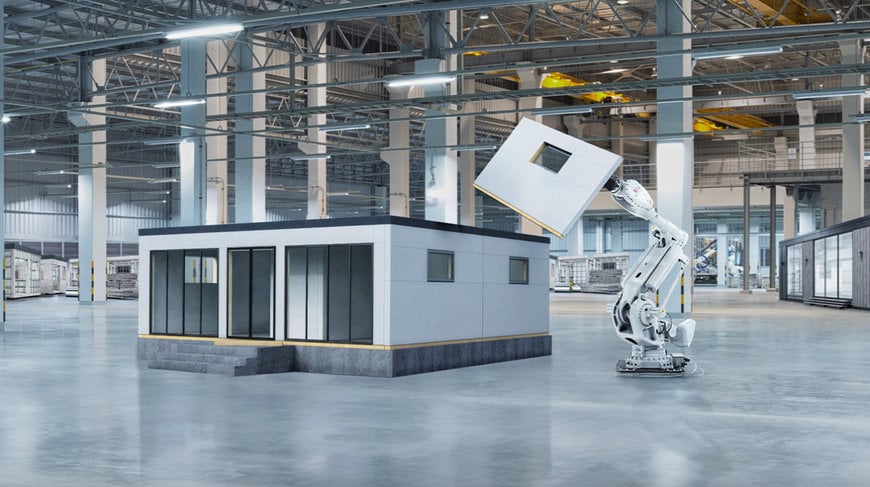www.industryemea.com
24
'23
Written on Modified on
ABB ROBOTICS AND PORSCHE CONSULTING COLLABORATE TO AUTOMATE THE CONSTRUCTION INDUSTRY
The collaboration will integrate automation, advanced planning and design of large-scale factories to transform modular housing manufacturing.

Conceptual animation construction factory
ABB Robotics and Porsche Consulting have announced their collaboration to drive automation in the construction industry with a pilot project to develop innovative new practices in modular housing manufacture. The collaboration will help to meet the need for more affordable and sustainable buildings and reduce the environmental impact of construction, amidst widespread labour and skills shortages.
Construction-related occupations typically dominate the list of labor shortages, a contributing factor to the shortage of housing in many countries. In the United States, labour shortages are contributing to a housing shortfall of nearly four million homes, while Germany is forecast to have housing supply shortages in 35 of its cities by 2030.
The traditional construction sector is struggling to meet the demand for new homes, while the environmental performance and efficiency of buildings need to improve, along with the adoption of more sustainable construction methods. These include reducing the transportation of raw materials to construction sites and eliminating the corresponding costs and impact of removing unwanted materials and waste. This is estimated to account for up to 25 percent of the material transported to a building site.

Conceptual construction factory modular homes
Modular construction will yield efficiencies through the reduction in material wastage and the number of days lost to adverse weather conditions. Factories also provide a safer and more hospitable working environment, as construction workers account for around 30 percent of workplace injuries and are four times more likely to be involved in a fatal accident versus other sectors.
Construction lags behind other industries in the adoption of automation and robotics. In a global survey commissioned by ABB of 1,900 large and small construction businesses in Europe, the US and China, only 55 percent of construction companies say they use robots, compared with 84 percent in automotive and 79 percent in manufacturing. The survey also shows 81 percent of construction businesses plan to introduce or increase the use of robotics and automation in the next decade.
ABB Robotics and Porsche Consulting have announced their collaboration to drive automation in the construction industry with a pilot project to develop innovative new practices in modular housing manufacture. The collaboration will help to meet the need for more affordable and sustainable buildings and reduce the environmental impact of construction, amidst widespread labour and skills shortages.
Construction-related occupations typically dominate the list of labor shortages, a contributing factor to the shortage of housing in many countries. In the United States, labour shortages are contributing to a housing shortfall of nearly four million homes, while Germany is forecast to have housing supply shortages in 35 of its cities by 2030.
The traditional construction sector is struggling to meet the demand for new homes, while the environmental performance and efficiency of buildings need to improve, along with the adoption of more sustainable construction methods. These include reducing the transportation of raw materials to construction sites and eliminating the corresponding costs and impact of removing unwanted materials and waste. This is estimated to account for up to 25 percent of the material transported to a building site.

Conceptual construction factory modular homes
Modular construction will yield efficiencies through the reduction in material wastage and the number of days lost to adverse weather conditions. Factories also provide a safer and more hospitable working environment, as construction workers account for around 30 percent of workplace injuries and are four times more likely to be involved in a fatal accident versus other sectors.
Construction lags behind other industries in the adoption of automation and robotics. In a global survey commissioned by ABB of 1,900 large and small construction businesses in Europe, the US and China, only 55 percent of construction companies say they use robots, compared with 84 percent in automotive and 79 percent in manufacturing. The survey also shows 81 percent of construction businesses plan to introduce or increase the use of robotics and automation in the next decade.
www.abb.com

